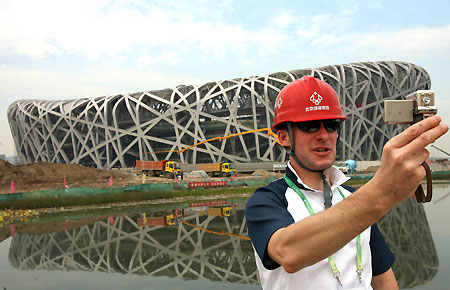Foreign publications will be accessible to foreign participants at the Olympic Games in 2008, when a ban on the printing of foreign newspapers and magazines is temporarily lifted next year, Liu Binjie, minister of the General Administration of Press and Publication, has said.
 An overseas reporter takes a picture of himself in front of the construction site of the National Olympic Stadium, also known as the Bird's Nest, September 10, 2007. Foreign publications will be accessible to foreign participants at the Olympic Games in 2008, Liu Binjie, minister of the General Administration of Press and Publication, has said. [Xinhua]
An overseas reporter takes a picture of himself in front of the construction site of the National Olympic Stadium, also known as the Bird's Nest, September 10, 2007. Foreign publications will be accessible to foreign participants at the Olympic Games in 2008, Liu Binjie, minister of the General Administration of Press and Publication, has said. [Xinhua] |
This is in accordance with the practice adopted by previous Olympics hosts that overseas delegations and athletes can read newspapers from their home countries, Liu said.
To achieve this, overseas publications will be printed in the country, imported from abroad, or electronic versions will be accessible. Currently some foreign publications, imported from overseas, are already available in hotels and some other venues that foreign people often patronize.
"We will sum up the experience of the Olympic Games period and map out measures to be taken in the future," Liu said in an interview on the sidelines of the 17th National Congress of the Communist Party of China.
Liu said the country's laws ruled out foreign publications being directly printed and distributed in China.
"This direction has been set," Liu said, adding some foreign publications in special economic zones were going through procedures permitting them to be published.
Some overseas publications are already widely circulated in China, in cooperation with their domestic counterparts.
Liu said the country backs local newspapers, publishing groups and government news websites to engage in domestic and overseas exchanges as part of broad reforms of the previously State-sponsored industry.
The long-awaited listing of Liaoning Publishing Group, one of China's largest, is expected to go ahead within two months, with 13 other publishing groups preparing listings.
Liu said the publisher would now list all its operations, but soaring local stock prices had prompted it to issue its shares domestically, rather than in Hong Kong as originally planned.
Liu said authorities were also pushing for public share issues by government news websites.
"By being listed they can raise capital and boost their strength, further extending the reach of our propaganda policies," Liu said.
Liu said any newspaper that successfully reformed its corporate structure could list in China or overseas.
Agencies contributed to this story